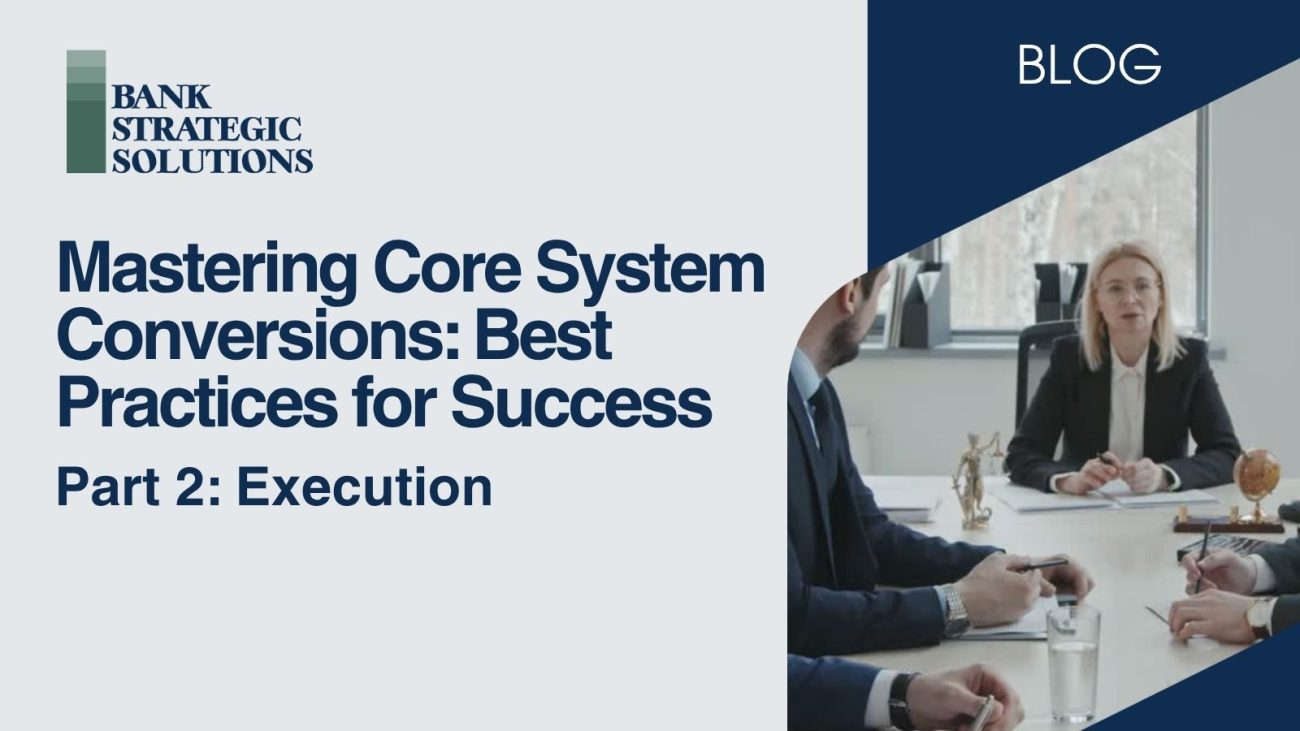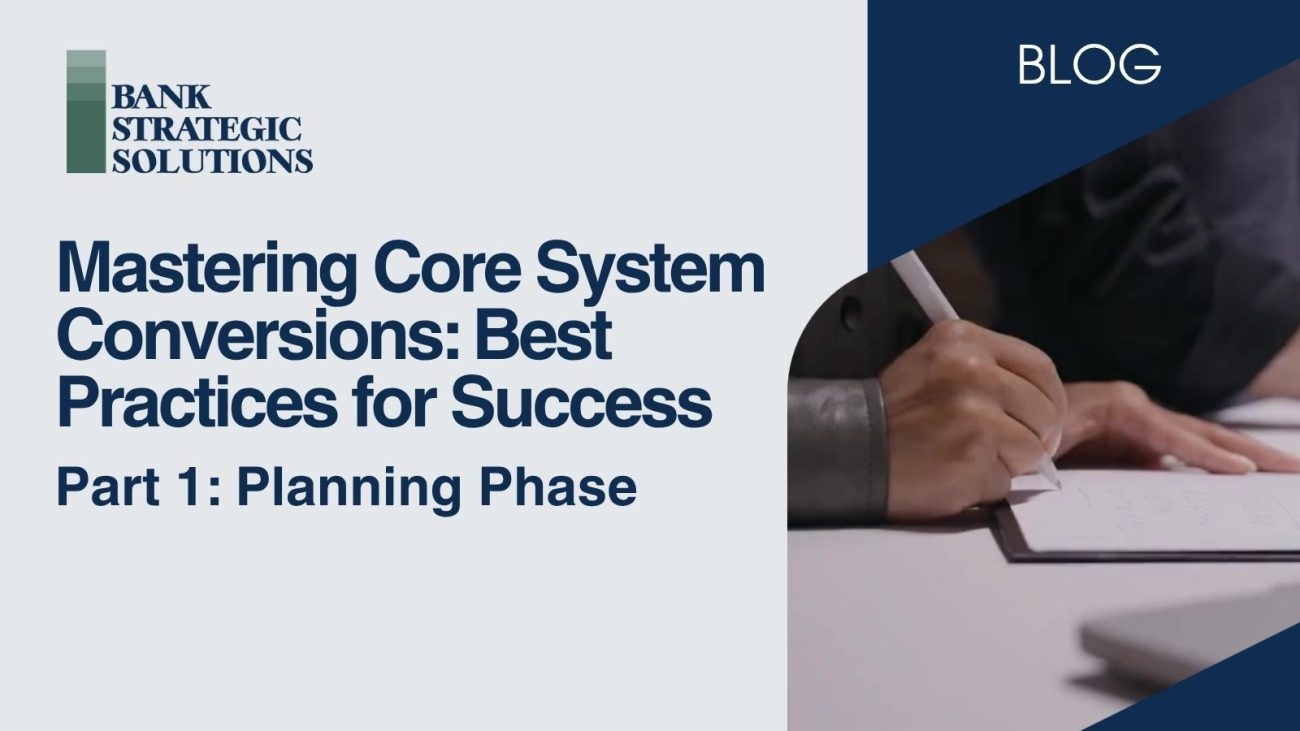Strategic Project Management: The Key to Successful Banking Transformation
Banking transformation projects often fail due to misalignment, scope creep, and resource constraints. Strategic project management aligns initiatives with business goals, adapts to changes, and ensures sustainable value delivery.

In an industry of constant change, the ability to successfully execute complex transformation initiatives has become a critical competitive advantage. Whether implementing new technologies, redesigning processes, or integrating merged organizations, banks are undertaking more ambitious projects than ever before.
Industry studies consistently show that 60-70% of banking transformation initiatives fail to fully achieve their objectives
Yet industry studies consistently show that 60-70% of banking transformation initiatives fail to fully achieve their objectives.
At Bank Strategic Solutions, our experience guiding financial institutions through numerous successful transformations has shown that strategic project management is often the difference between success and disappointment.
Beyond traditional execution disciplines, strategic project management aligns transformation initiatives with business strategy, adapts to evolving conditions, and ensures that changes deliver sustainable value.
The Evolution of Project Management in Banking
Project management in banking has evolved significantly in recent years:
From IT-Focused to Enterprise-Wide: Project management was once primarily an IT discipline but has expanded to encompass all areas of banking transformation.
From Process Compliance to Value Delivery: The focus has shifted from adherence to methodology toward measurable business outcomes.
From Sequential to Adaptive: Rigid waterfall approaches have given way to more flexible, iterative methodologies that better accommodate changing requirements.
From Technical to Strategic: Project management has evolved from a technical discipline to a strategic capability that directly enables business objectives.
This evolution reflects the increasing complexity and strategic importance of transformative initiatives in modern banking.
Common Challenges in Banking Transformation Projects
Our work with financial institutions across the country has revealed several common challenges that undermine transformation success:
1. Strategic Misalignment
Many banking projects begin with unclear connections to strategic objectives or fail to adapt as strategy evolves. This misalignment can lead to:
- Initiatives that deliver technical success but limited business value
- Competing projects that work at cross-purposes
- Resource allocation that doesn’t reflect strategic priorities
- Project goals that don’t measure meaningful business impact
2. Scope Expansion
Banking projects are particularly susceptible to “scope creep” due to:
- Complex interdependencies between systems and processes
- Evolving regulatory requirements
- Multiple stakeholder groups with diverse needs
- Legacy technology constraints that emerge during implementation
This expansion often leads to budget overruns, delayed completion, and diluted benefits.
3. Resource Constraints
Financial institutions frequently underestimate the resources required for successful transformation:
- Key team members are expected to maintain their operational responsibilities while supporting projects
- Specialized expertise in areas like data migration or regulatory compliance may be in short supply
- Business users are not sufficiently involved in design and testing
- Change management resources are inadequate for the scale of organizational impact
These constraints can compromise both project quality and timeline.
4. Implementation Challenges
Even well-designed transformations can falter during implementation due to:
- Inadequate testing, particularly of integration points between systems
- Insufficient consideration of downstream impact
- Poor communication with customers about changes that affect them
- Limited training and preparation for affected employees
- Lack of contingency planning for inevitable issues
These challenges often result in operational disruptions that undermine confidence in the transformation.
The Strategic Project Management Difference
At Bank Strategic, we’ve developed a strategic approach to project management that addresses these common challenges and significantly improves transformation outcomes. Key elements include:
1. Strategic Alignment Framework
We begin every project by establishing clear connections to strategic objectives:
- Defining specific business outcomes the project will deliver
- Identifying key performance indicators that measure strategic impact
- Creating governance mechanisms that maintain alignment throughout execution
- Building flexibility to adapt as strategy evolves
This framework ensures that projects remain focused on delivering meaningful business value.
2. Comprehensive Planning Approach
Our planning methodology addresses all dimensions of successful transformation:
- Realistic resource requirements, including often-overlooked needs like subject matter expert time
- Interdependencies with other initiatives and operational activities
- Specific regulatory and compliance considerations
- Detailed change management and communication strategies
This comprehensive approach provides a solid foundation for execution while avoiding common planning blind spots.
3. Adaptive Execution Model
We implement flexible, milestone-based approaches that accommodate the realities of banking transformation:
- Regular reassessment of assumptions and constraints
- Structured processes for evaluating and incorporating necessary scope changes
- Continuous stakeholder engagement to ensure evolving needs are addressed
- Clear escalation paths for addressing emerging issues
This adaptive model maintains momentum while accommodating inevitable changes.
4. Value Delivery Focus
Throughout execution, we maintain unwavering focus on the business value the transformation is intended to deliver:
- Regular validation that the project remains on track to achieve business objectives
- Early identification of potential value gaps
- Proactive adjustment of plans to maximize value delivery
- Transition planning that ensures sustainable benefits realization
This focus ensures that technical success translates into meaningful business impact.
Enterprise Program Management: Orchestrating Complex Transformation
For financial institutions undertaking multiple interconnected initiatives, Enterprise Program Management Offices (EPMOs) provide a powerful framework for coordinating efforts and maximizing value. At Bank Strategic, we help banks design and implement EPMOs that:
1. Align Project Management with Strategy
Effective EPMOs ensure that the organization’s project portfolio directly supports strategic priorities:
- Establishing clear evaluation criteria for project selection and prioritization
- Implementing transparent processes for resource allocation
- Creating mechanisms to adjust the portfolio prioritization as strategy evolves
- Developing metrics that measure project strategic impact to the organization
2. Optimize Resource Utilization
EPMOs enable more effective use of limited transformation resources:
- Providing visibility into resource demands across projects
- Identifying and addressing resource conflicts before they impact schedules
- Facilitating the strategic deployment of specialized expertise
- Supporting more accurate capacity planning for future initiatives
3. Manage Dependencies
Banking transformations typically involve complex interdependencies that EPMOs help navigate:
- Identifying and tracking cross-project dependencies
- Coordinating schedules to minimize integration risks
- Facilitating communication between related initiatives
- Providing early warning of potential cascading impacts
4. Standardize Methodologies
EPMOs establish consistent approaches that improve efficiency and effectiveness:
- Developing standardized tools and templates tailored to the institution’s needs
- Creating common reporting mechanisms that enable meaningful comparison across projects
- Establishing consistent quality standards for key deliverables
- Building institutional project management capabilities through training and mentoring
5. Drive Continuous Improvement
Effective EPMOs facilitate organizational learning and capability enhancement:
- Conducting post-implementation reviews to capture lessons learned
- Identifying recurring challenges and developing systemic solutions
- Sharing best practices across project teams
- Measuring and improving project management maturity over time
The Bank Strategic Approach to Strategic Project Management
At Bank Strategic, our approach to strategic project management is grounded in decades of hands-on experience leading complex banking transformations.
Key elements that differentiate our approach include:
1. Banking-Specific Expertise
Our project management approach is tailored to the unique characteristics of financial institution transformations:
- Integration of regulatory and compliance considerations throughout the project lifecycle
- Specific methodologies for common banking projects like core conversions and merger integrations
- Emphasis on maintaining operational stability during transformation
- Recognition of the unique cultural aspects of banking organizations
2. Practical Implementation Focus
Our team of experienced bank executives brings practical implementation experience rather than just theoretical knowledge:
- Ability to anticipate and address common banking implementation challenges
- Understanding of operational constraints that influence project planning
- Recognition of the critical success factors for different types of banking transformations
- Experience balancing transformation objectives with day-to-day operational requirements
3. Integrated Change Management
We integrate change management into our project approach rather than treating it as a separate workstream:
- Early assessment of organizational readiness and change impacts
- Development of change strategies tailored to the institution’s culture
- Integration of change activities into project plans and timelines
- Emphasis on building sustained adoption rather than just initial implementation
4. Knowledge Transfer Emphasis
We focus on building our clients’ internal capabilities throughout our engagements:
- Structured knowledge transfer processes for key methodologies and tools
- Side-by-side working model that enables learning through doing
- Development of internal champions to sustain practices after our engagement ends
- Creation of tailored playbooks for future transformation initiatives
Building Your Strategic Project Management Capability
For financial institutions looking to enhance their ability to successfully execute transformations, we recommend focusing on these key areas:
- Assess your current project management maturity using a framework specifically designed for financial institutions
- Develop a tailored enhancement roadmap that addresses your specific challenges and opportunities
- Invest in building both technical and leadership skills in your project management resources
- Implement appropriate governance mechanisms that balance oversight with execution agility
- Create success metrics that measure business outcomes, not just project execution efficiency
By approaching project management as a strategic capability rather than just an execution methodology, banks can significantly improve their ability to implement transformative change and realize the full potential of their investments.
Recent Articles
- Stronger Together
 Gregory A. Noonan & Associates and Bank Strategic Solutions Join Forces to Create Powerhouse in Banking Transformation
Gregory A. Noonan & Associates and Bank Strategic Solutions Join Forces to Create Powerhouse in Banking Transformation - Mastering Core System Conversions: Best Practices for Success
 Part 2: Execution
Part 2: Execution
Core conversions are considered a necessary evil by many bankers. It’s a huge undertaking and impacts nearly everyone in the bank, not to mention customers. - Mastering Core System Conversions: Best Practices for Success
 Part 1: Planning Phase
Part 1: Planning Phase
A core system conversion is one of the most complex and consequential undertakings banks can face. It’s not just a technology switch; it’s a complete transformation that impacts operations, customer experience, compliance, and competitive positioning.
